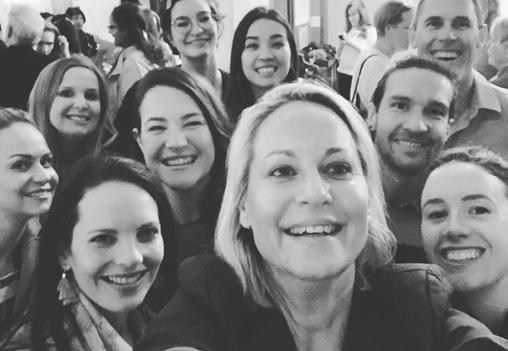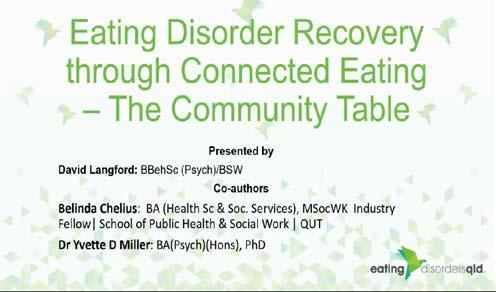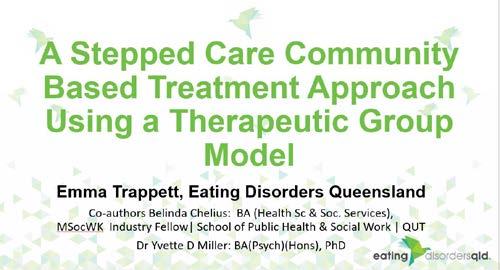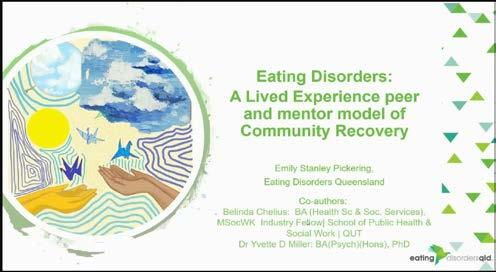
3 minute read
Conferences
Within the financial year EDQ was lucky enough to attend two conferences! One in person and one virtually.
Advertisement
The EDQ team travelled to Adelaide for the Australian and New Zealand Academy for Eating Disorders (ANZAED) conference in August 2019 to connect with other professionals in the field, present on our programs and develop our professional knowledge around the latest research. EDQ were excited to have their abstracts accepted to talk about two programs, Peer Mentor Program and Community Table.
Belinda Chelius and David Langford presented some pilot research on our program, Community Table – community-based meal support as
an innovative program. They described the development and delivery of the program and some preliminary data. Belinda and David reported that there were reductions in eating disorder symptom severity (all subscales) from the pilot data and data would continue to be analysed for future research and continuous improvement.
Eating Issues Practitioners, Emily Stanley-Pickering and Emma Trappett presented on the Peer Mentor Program. They discussed the development and growth of the program, outlined previous research and discussed consistent themes that had emerged through feedback about the PMP program. These dominant themes were support, connection, friendship and communication skills.

International Conference for Eating Disorders
EDQ were thrilled to be a sponsor of the International Conference for Eating Disorders Conference (ICED) in June 2020. The theme was Taking a Different Perspective.
ICED runs conferences internationally every year and in 2020 was set to be hosted in Sydney, Australia. Due to the COVID-19 pandemic the conference was moved to an online platform which allowed the team to access the latest international research, network with other professionals and present on our own programs including the Peer Mentor Program, Community Table and 10-wk Therapeutic Group.
EDQ was excited have three abstracts accepted to present on our programs.
We presented on:
Community Table,
Peer Mentor Program and
10-week Therapeutic Group.
The data analyses were completed in conjunction with Dr Yvette Miller from QUT.

David Langford presented on our community
meal support program, Community Table. David reduction in eating disorder symptom severity on all EDE-Q subscales except eating concern following completion of the program. Overall, there was a statistically significant reduction in overall symptom severity from pre to post program. There was a statistically significant improvement on all subscales on the RAS-DS which looks at recovery focus except doing things I value from which there was still an improvement. Emma also discussed limitations of the research and future considerations.
discussed the origins of the program and delivery and built on the findings from previous evaluations and conferences. The data demonstrated a reduction in eating disorder symptom severity for all EDE-Q subscales following completion of the program. The reduction in restraint and shape concerns was statistically significant. There was a very confident reduction observed in the Global EDE-Q score. David also discussed limitations of the
Emma Trappett presented on 10-week Therapeutic Group. Emma discussed the history of the group program and previous research
findings. The data showed a statistically significant research and future considerations.
Emily Stanley-Pickering presented on Peer Mentor Program and built on findings
from the previous year. Emily discussed some of the themes present within mentee feedback including a space to share, support, connection, sense of belonging and the mentor relationship as all being important. Emily talked about some ways the PMP program had been helpful for mentees and demonstrated that focus on recovery and eating disorder symptoms remained stable throughout the program.












